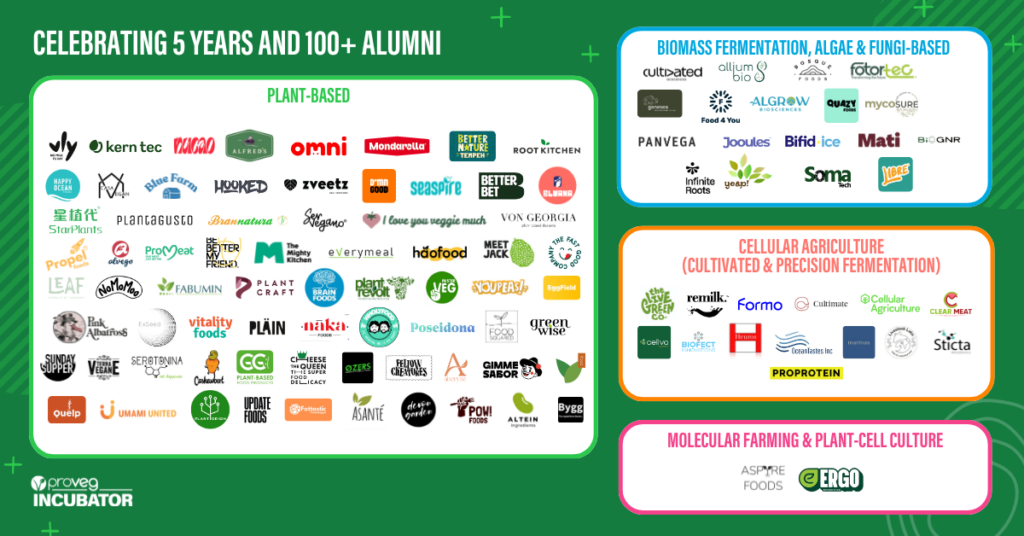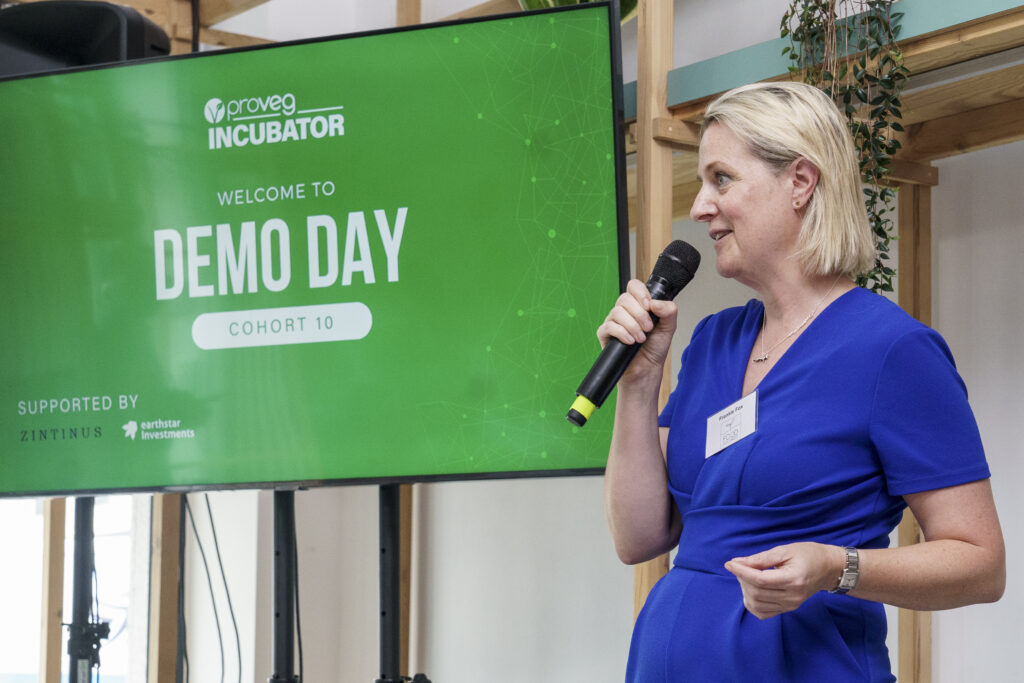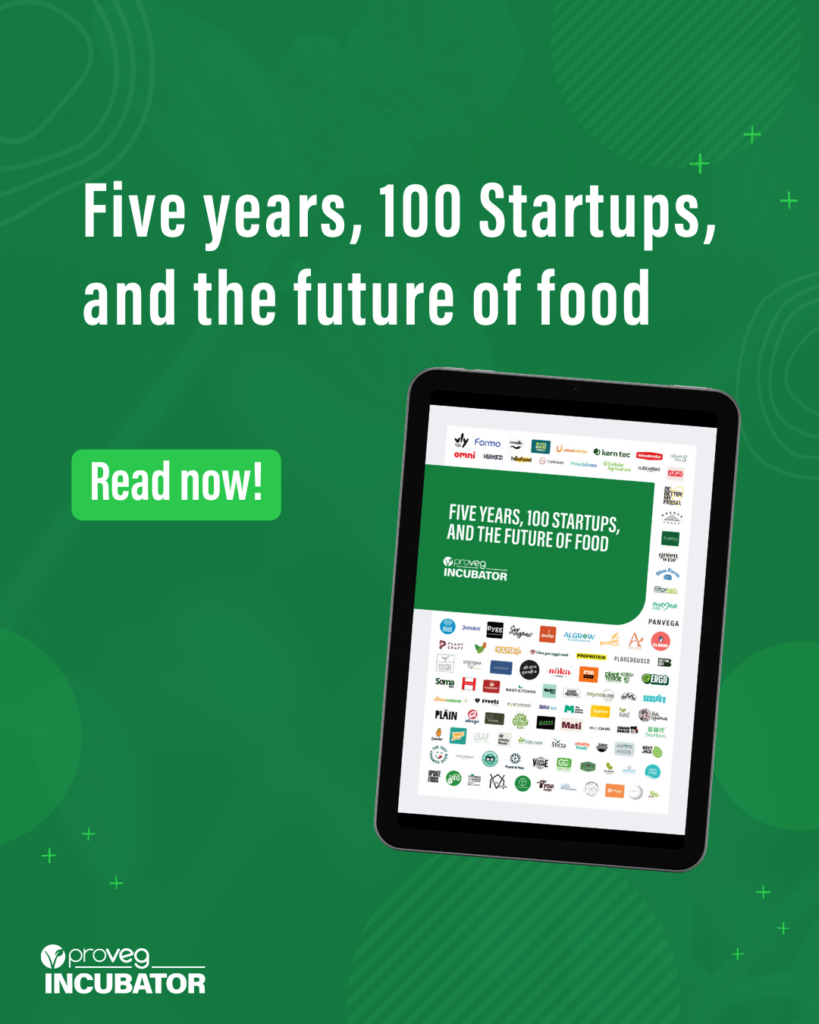Alternative protein is navigating a correction phase but will grow and accelerate change
The alternative protein sector (like many food and beverage industries) has faced challenges in recent years – with a reported ‘downturn’ in sales and struggles with capacity. However, according to a new report, the alternative protein sector is navigating a necessary correction phase that will strengthen its long-term outlook and resilience.
The report – Five Years, 100 Startups, and the Future of Food – led by ProVeg Incubator, shares industry trends, insights, and an outlook for the future. It also celebrates the Incubator programme’s milestone of supporting over 100 startups over the past five years. ProVeg Incubator, part of ProVeg International, is a program designed to support alt-protein and food-tech startups.

The team has supported 105 startups spanning a growing number of sub-sectors that include plant-based (71), biomass fermentation, algae- and fungi-based (18), cellular agriculture and precision fermentation (14), plant-cell culture (1), and molecular farming (1).
“We are beyond the first wave of product innovation and consumer adoption. The next wave will lead the way, and further accelerate the transformation and growth of the industry.”
Read on for the report’s key takeaways.
Correction phase
The alternative protein sector has been affected by a challenging macroeconomic environment, while also navigating a correction phase in sentiment among consumers and investors, as is common for almost all high-growth consumer segments.

“The industry is simmering down, not burning out. Like any emerging sector, this is a healthy recalibration, separating the true potential from the hype. This consolidation will help the sector bounce back stronger on the other side,” explains Divya Murthy, Co-head and Investment Lead, at the ProVeg Incubator.
The future is bright
We anticipate that 2024-25 will be a challenging period. Harsh economic conditions and a difficult investment landscape will lead to further consolidation in the sector. But, according to the Incubator’s report, there’s also plenty of cause for optimism.
A new wave of more price-competitive products is hitting the market with cleaner labels, better taste and nutritional values, and improved texture. At the same time, cultivated meat products are gradually being approved and available in some markets, while new products made using fermentation and mycoprotein are also now available to buy.
“We expect a wave of plant-based 2.0 products and a steady flow of new product success stories that will generate a new narrative for the alternative protein category, leading to improved investment conditions for startups,” adds Hédi Farhat, Investment Manager, at ProVeg Incubator.
Next: New pathways and collaboration
We predict significant progress in alt-protein product development in the next three to five years. By then, most alt-protein products will likely match conventional products in taste, texture, and price.

Additionally, as regulatory pathways improve, the cultivated and precision fermentation sectors will mature significantly, particularly in the US and Singapore, and potentially in Europe.
Later: Investment upswing, widespread alt-protein technology, and new market opportunities
Over the next eight to 10 years, expect that alt-protein products will become the default option for most people, as alt-protein functionality improves and more and more consumers make the connection between animal-based products and the climate crisis. By then, there will also be considerably more options available for alternatives to conventional animal-based products.
“We’ll see more cultivated foods available at restaurants in Singapore and the US. In Europe, where regulatory approval is slower, the first wave of restaurants will have cultivated meat and seafood on their menus.”
In 10 years
As technology accelerates and funding recovers, we foresee mainstream adoption in the next decade, with investment likely to increase significantly. “In 10 years, we expect alternative protein funding to surpass USD 10 billion a year, more than doubling the 2021 figure,” says Wolfmeyer.

“At the same time, much more capital will be needed to drive the transformation of our food systems. Strategic investors, corporations, and especially public funds and programs – which a couple of countries have already started – will play a pivotal role here,” he said.
What’s in the report?
The state of the market
Trends
Outlook
Industry views
The 100 startups

Dive into the full report, here.
For more news, insights and support on your alternative protein strategy, contact ProVeg’s experts at [email protected].
Check out our interviews with some of our ProVeg Incubator alumni: Omni Pet Food, Wildtype Foods, Food Squared, Infinite Roots.



